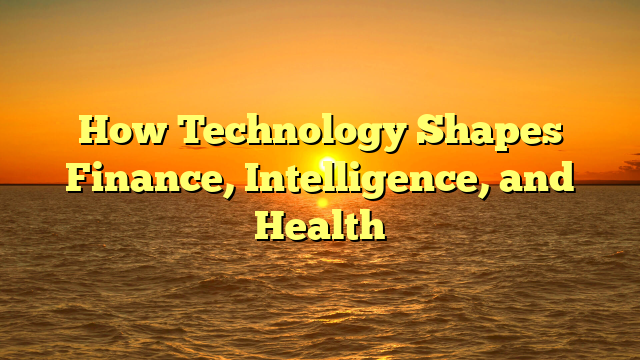The rapid growth of technological innovation is influencing almost every field of our existence. Whether it’s through fintech, the rise of artificial intelligence (AI), or breakthroughs in medical technology, we are witnessing a revolution that is changing how finance works, how we perceive intelligence, and improve healthcare systems. papadewa explores how these advancements are reshaping our world in positive and challenging ways.
How Technology is Reshaping the Financial Landscape
The finance industry has undergone a radical transformation thanks to the advent of technology. In recent years, fintech has changed the way businesses and individuals manage their money, making financial services more accessible, efficient, and secure.
Blockchain, for example, has emerged as a powerful tool for securing transactions, and its potential extends far beyond cryptocurrencies like Bitcoin. With its ability to create secure, tamper-proof digital records, blockchain is being explored for use in smart contracts, digital currencies, and reducing fraud in financial systems.
AI is transforming the financial industry by enabling more efficient and personalized services. For example, AI-powered algorithms are now used to make investment decisions, track market trends, and even provide personalized financial advice, democratizing wealth management for individuals from all backgrounds.
Artificial Intelligence: A New Era of Intelligence
Artificial Intelligence (AI) has emerged as one of the most transformative technologies in recent years. Its ability to process large amounts of data and make decisions based on patterns has revolutionized industries such as healthcare, finance, and transportation. AI is not only changing how we interact with technology, but also how we understand human intelligence.
In the realm of healthcare, AI-powered diagnostic tools are enabling doctors to make more accurate diagnoses, predict potential health risks, and develop personalized treatment plans. AI is also being used in drug discovery and genomics, helping to uncover new therapies for diseases that were once considered untreatable.
Moreover, AI is helping to close the divide between human intelligence and machine learning. In fields such as neuroscience, AI is being used to model and understand the complexities of the human brain, bringing us closer to creating machines that can think and reason in ways that mimic human cognition.
Health and Technology: Transforming the Healthcare System
The healthcare industry is undergoing a digital revolution, driven by advancements in remote healthcare services, wearable devices, and data analytics. These technologies are improving healthcare delivery, increasing accessibility, and reducing costs.
Telemedicine, for example, has become an essential tool, especially in rural areas or regions with limited access to healthcare facilities. Through virtual consultations, patients can receive medical advice and prescriptions without the need for an in-person visit. This not only improves access to healthcare but also reduces the strain on overburdened healthcare systems.
Wearable technology is also playing an increasingly important role in healthcare by allowing individuals to monitor their health in real-time. Devices such as fitness trackers, smartwatches, and even smart clothing provide continuous data on various health metrics, helping individuals stay informed and make better lifestyle choices. Additionally, these devices are aiding in early disease detection and prevention.
Artificial intelligence is revolutionizing the way healthcare is delivered. AI is being used to analyze vast amounts of patient data, from medical imaging to electronic health records (EHRs), to provide faster and more accurate diagnoses. AI-powered systems are helping healthcare providers identify health risks and offer personalized treatments based on a patient’s unique genetic and medical history.
Conclusion
In summary, technology is at the forefront of transforming finance, intelligence, and healthcare. These sectors are experiencing rapid changes that bring new possibilities and challenges. As we look to the future, staying informed and adapting to these technological advancements will be key to leveraging their potential for personal and societal growth.
